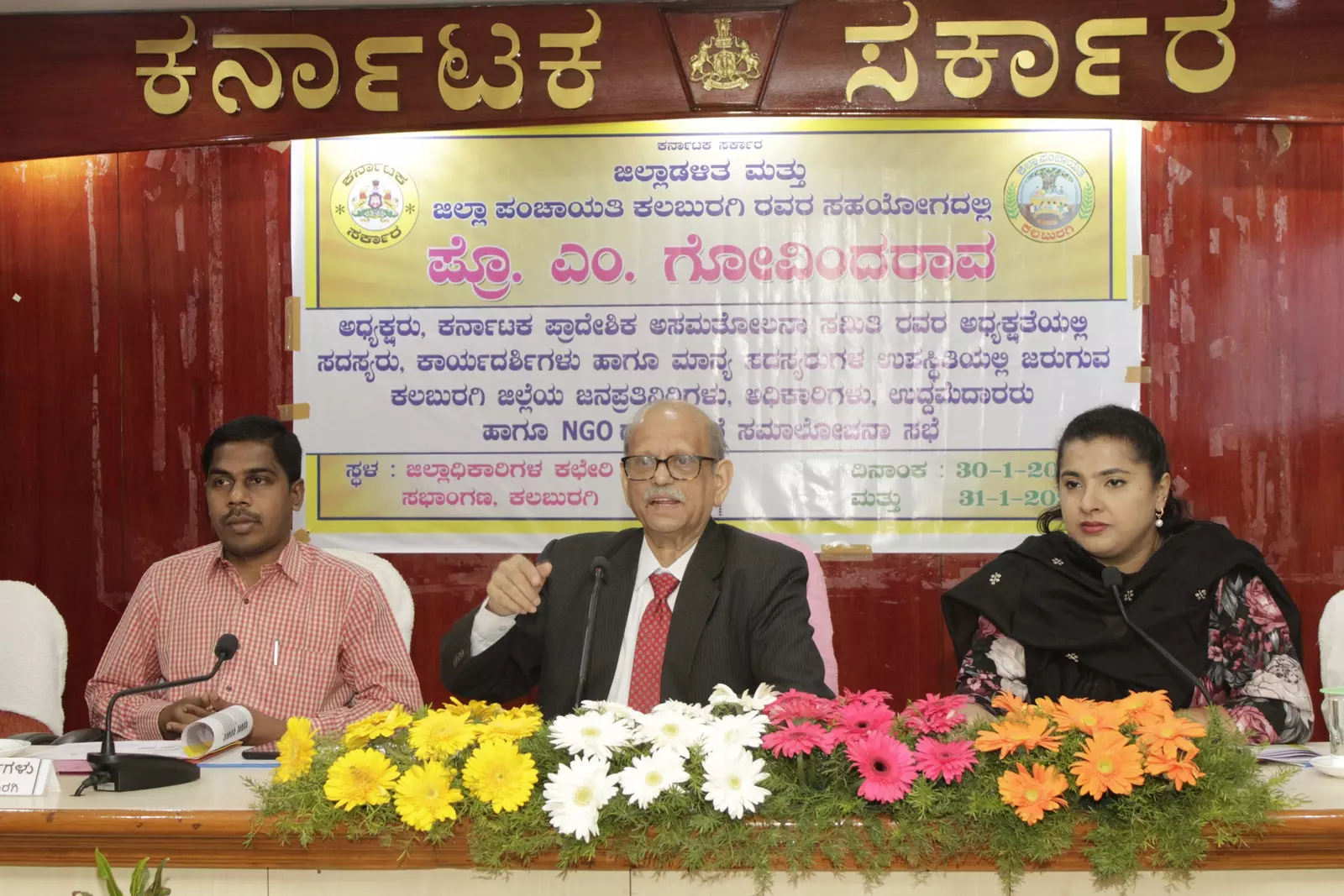Regional imbalance redressal committee meeting in Kalaburagi

Karnataka Regional Imbalance Redressal Committee will complete district-wise opinion collection by March to set new development indicators based on the progress achieved in backward areas, committee chairman Prof. M. Govinda Rao announced on Thursday. (Image: DC)
Kalaburagi: The Karnataka Regional Imbalance Redressal Committee will complete district-wise opinion collection by March to set new development indicators based on the progress achieved in backward areas, committee chairman Prof. M. Govinda Rao announced on Thursday.
Speaking to reporters after a meeting at the Kalaburagi Deputy Commissioner’s office, he stated that the committee's report, incorporating additional indicators beyond those in the Dr. DM Nanjundappa report, will be submitted to the government by September.
“Though thousands of crores have been allocated to backward regions as per the Nanjundappa report, per capita income has declined. The new report will take into account income instability and socio-economic outcomes, with a special focus on education and healthcare,” he said.
Prof. Goinda Rao noted that the committee began its work in September last year and has already sent questionnaires to relevant departments. While district-wise analysis is nearing completion, taluk-wise assessments are pending. Committee members will visit districts to gather inputs from elected representatives, officials, organizations, and the public. Additionally, data collection is underway.
Earlier presiding over the consultation meeting at DC’s office, Prof Govinda Rao said that despite significant funds being spent on the development of backward regions in Karnataka, regional disparities persist in several taluks. He emphasized that private institutions must collaborate with the government to bridge this gap.
He noted that while the Dr DM Nanjundappa report recommended government intervention, the private sector's growing role in development makes its contribution essential.
"Despite thousands of crores being spent, many taluks remain backward. According to census data from 2011 and statistics from 2022-23, taluks in Kittur Karnataka and Kalyana Karnataka are still lagging in education, healthcare, and per capita income. The committee will identify the causes of this and recommend corrective measures to the government," he said.
"Of the 175 taluks identified in previous studies, 114 are categorized as backward, and 39 as extremely backward. Among these, 26 are in North Karnataka and 13 in South Karnataka," he explained.
Committee member Dr. Suryanarayana Mungil Hillemani pointed out alarming issues such as high maternal and infant mortality rates, lack of doctors in healthcare centers, and inadequate sanitation facilities in schools.
"In Chittapur taluk alone, 34 schools lack toilets. In Aland, Yadrami, Kalgi, Chincholi, and Sedam taluks, 10% of schools lack proper sanitation, forcing parents to hesitate in sending their daughters to school. Without gender equality and literacy, holistic development is impossible," he warned.
Kalyana Karnataka Chamber of Commerce and Industry (KKCCI) former president Umakant Nigudagi stressed the need for a separate industrial policy and ministry for Kalyana Karnataka, proposing an investor summit in Kalaburagi modeled after Gujarat’s Vibrant Gujarat summit. He also questioned why Yadgir and Raichur were the only Karnataka districts included in NITI Aayog’s list of backward districts while Kalaburagi was excluded.
Laxman Dasti, president of the Hyderabad Karnataka Horata Samiti suggested that the committee should consider village-level statistics to ensure balanced development. "While Bengaluru is among the most developed cities globally, Kalaburagi remains one of India's most backward districts. This disparity cannot be ignored," he said.
( Source : Deccan Chronicle )
Next Story

